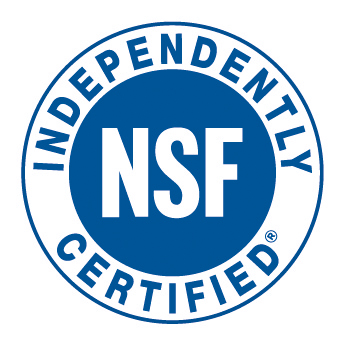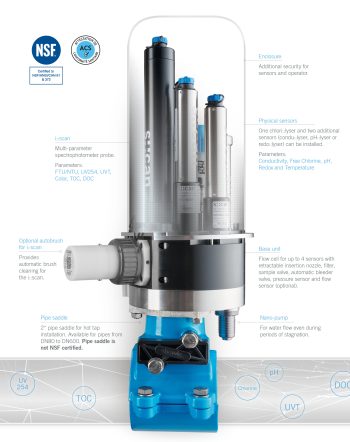May 2023 – Did you know our pipe::scan is NSF drinking water certified? Find out what this means and how the pipe::scan is able to monitor drinking water at any point within a drinking water network.
The pipe::scan is NSF drinking water certified

The pipe::scan is NSF drinking water certified
Many water utilities face the same problem: how to monitor water quality within the water distribution system with no reagents and no waste streams.
The pipe::scan, a modular sensor system is the solution to this problem and is available for water utilities everywhere. The NSF/ANSI/CAN 61- and 372-certified system monitors drinking water quality in pipes under pressure and can measure up to 10 parameters in one device, including organics (TOC, DOC, UV254), turbidity, color, pH, conductivity, temperature and pressure. The water quality data can be sent to BEACON® SaaS or central databases via most protocols.
What is the NSF Certification?
The NSF Certification is ensuring that our products meet strict standards. Our materials and processes have undergone a safety evaluation and inspection by NSF, an independent organization, to ensure public health protection. To obtain NSF certification, the pipe::scan undergoes rigorous testing and material analyses, and the manufacturing facility must pass an inspection to verify production methods and allow for product sampling by NSF International auditors. This process ensures that the pipe::scan meets the required standards.
What does the NSF/ANSI/CAN 61 and NSF/ANSI/CAN 372 certification mean?
NSF/ANSI 61:(Opens in a new tab or window) Drinking Water System Components – Health Effects is an American National Standard that establishes minimum health-effects requirements for the chemical contaminants and impurities that are indirectly imparted to drinking water from products, components and materials used in drinking water systems.
NSF/ANSI/CAN 372:(Opens in a new tab or window) Drinking Water System Components – Lead Content is an American National Standard that establishes a standardized methodology for the determination and verification of product compliance to minimize lead contaminants.
The standard is routinely monitored and updated by a joint committee comprised of equal parts public health experts, end users and industry members.
